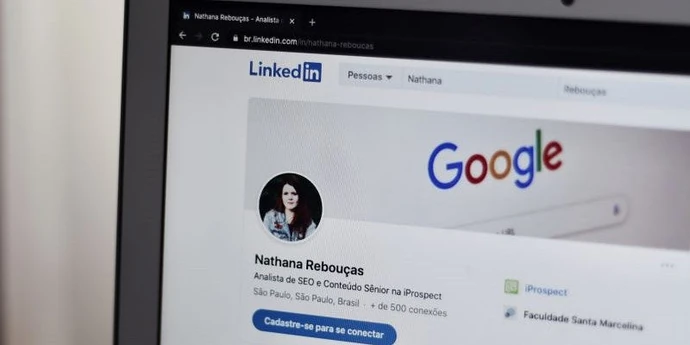Getting a job at Meta isn't easy: acceptance rates are low, and the hiring process is challenging. But if you make it in, it can be a game-changer; a great salary, huge growth opportunities, and the chance to work on huge global products like Instagram, WhatsApp, and Facebook.
Plus, the prestige of having even just one year at Meta will open doors for you moving forward.
Below, we’ve laid out the main steps you’ll need to take to get into Meta. Whether you’re a recent graduate or an experienced professional, we’ve helped thousands of people like you get job offers at Meta and other top tech companies.
1. Learn about Meta
2. Understand the requirements
3. Choose the right role
4. Optimize your resume for Meta
5. Create a connection
6. Apply
7. Prepare for the interviews
Ready? Let’s go.
Click here to talk to an ex-Meta career coach
Okay, let's go through the seven steps you'll need to take to get a job at Meta (we'll point you to all the supporting resources that you'll need along the way).
1. Learn about Meta
Meta is 6th largest tech company in terms of market cap, and the 5th largest in terms of earnings.
On both counts, it's well behind Google and Apple, but you'll be pleased to know that it pays its employees even better (more on that below).
Besides its HQ in Menlo Park (near San Francisco), Meta has 62 offices around the world, including major offices in New York City, Seattle, London, Dublin, and Singapore.

1.1 What's it like to work at Meta?
1.1.1 Culture
One thing that many candidates find attractive about Meta is its “bottom-up” culture, designed to give managers the power to make decisions and act without having to wait for things to get signed off from above.
"There is an expectation that you will have a strong level of autonomy, ownership, and dealing with ambiguity," says Tom, ex-data engineering manager at Meta.
This helps encourage a culture of getting stuff done quickly. The ex-Meta coaches that we work with tell us that the ‘Move fast and break things’ culture is real.
"At Meta things moved faster than at any company I have ever worked at." Mark R, former PM at both Meta and Google.
1.1.1 Employee benefits
Another reason that a lot of people want to work at Meta is its generous package of employee benefits programs:
- Health:
- Medical, dental and vision insurance for you and your family, including care on campus or near Meta campuses
- Reimbursement program for eligible expenses that support physical, mental, financial well-being and family care
- Programs that support autism care, cancer care and gender-affirming services
-
Family:
-
Paid leave for new parents, including adoptive parents
-
Family planning support, including fertility, adoption and surrogacy assistance
-
Dependent care FSA so you can pay for eligible care expenses with pre-tax money
-
Child and elder caregiving support programs
-
-
Time off
- 21 days of paid time off per year plus 12 paid holidays
- 2 paid Choice days
- Global Travel Days for personal travel where you can work from another city or country
- A 30-day paid break every five years, based on performance
1.2 How much does Meta pay?
Meta pays a lot. It's certainly one of the best-paying tech companies, maybe even the best. We used the data at Levelsfyi.com to compare Meta's salaries with other big tech companies below.
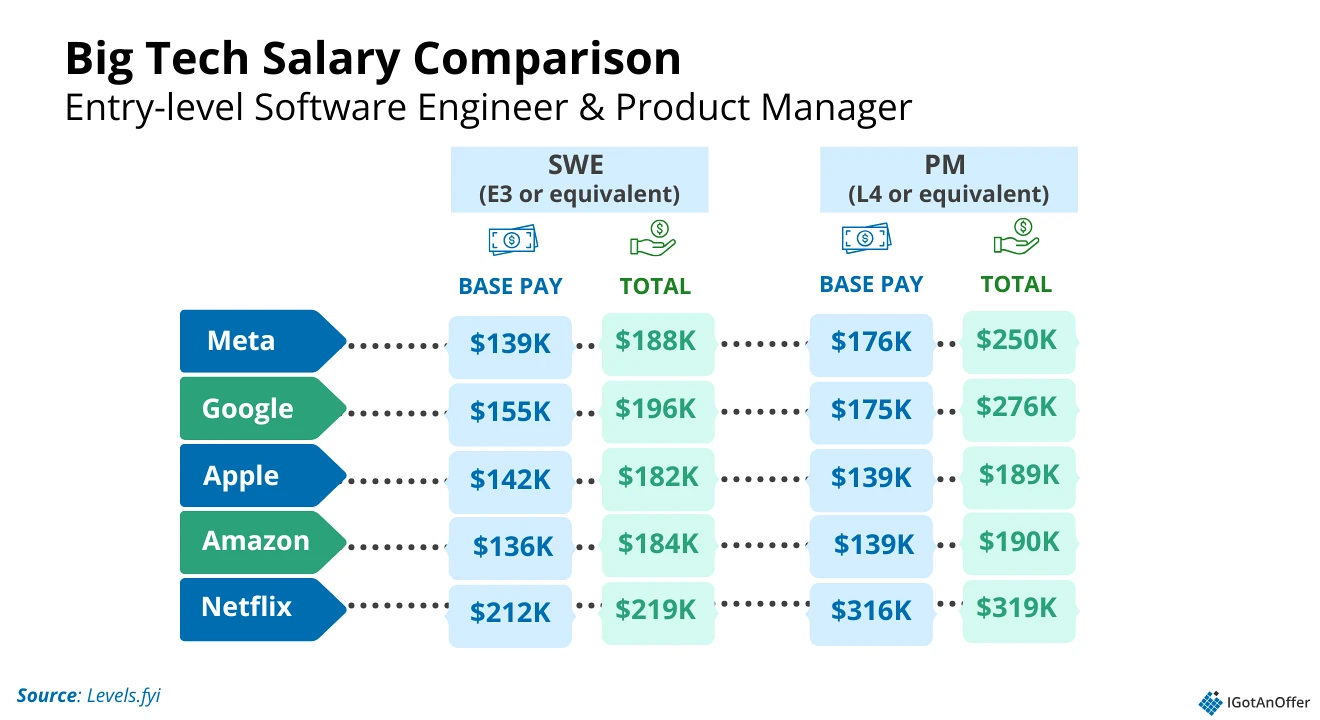
The more senior your role at Meta, the better your compensation is in comparison to other companies, largely due to generous stock options. You can see in the table below that from senior level, Meta pays even better than Google.
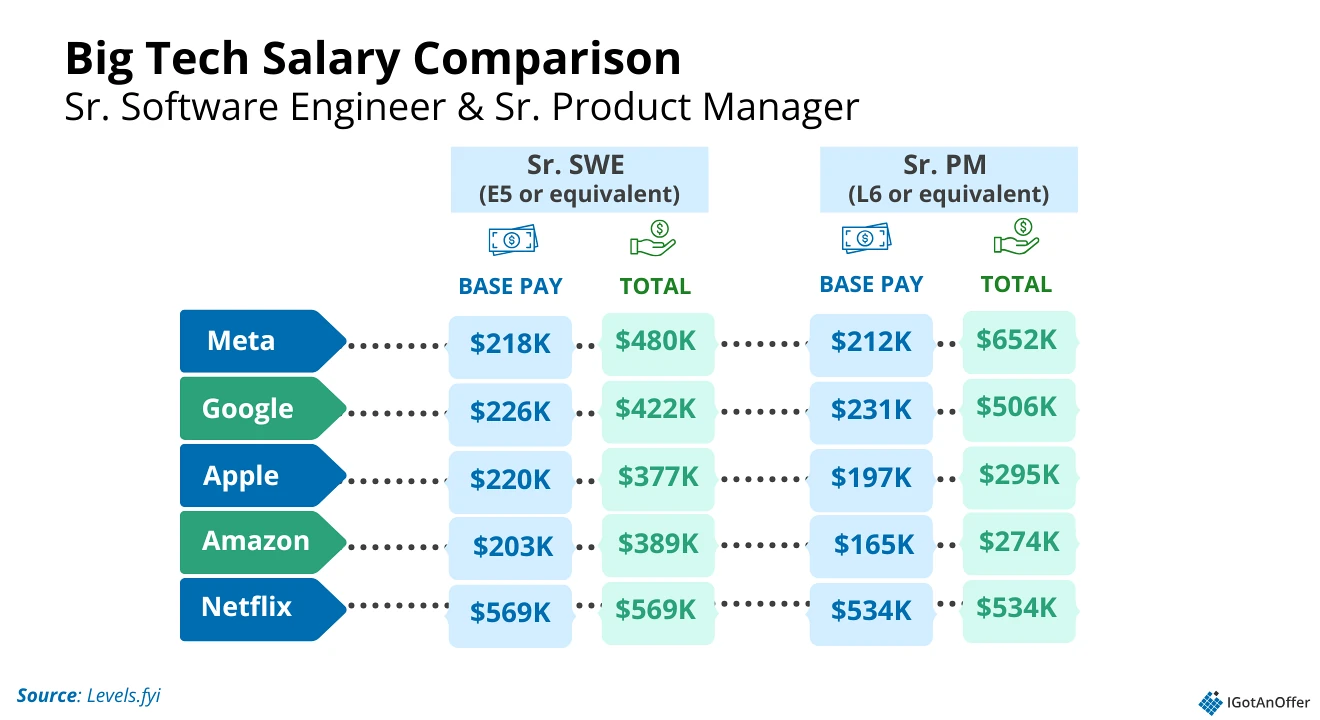
Want to learn more about what it's like working at Meta? This TrueUp page gives a good overview of the key stats, and Glassdoor has tons of anonymous reviews.
1.3 Is Meta hiring?
After subjecting itself to a "Year of Efficiency" in 2023 that entailed reducing headcount by almost 25% (around 20,000 employees left the company over 12 months), Meta started hiring again in 2024. There were still various layoffs throughout the year, but at a much smaller scale, and employee size increased by around 1.5k per quarter (Source: Meta press releases).
Meta has around 72,000 employees at the time of writing (December 2024) and we expect this to continue to rise in 2025.
You might want to learn more about Meta's interview process as well. To start, here's our very own Meta Interview Fact Sheet for your reference:
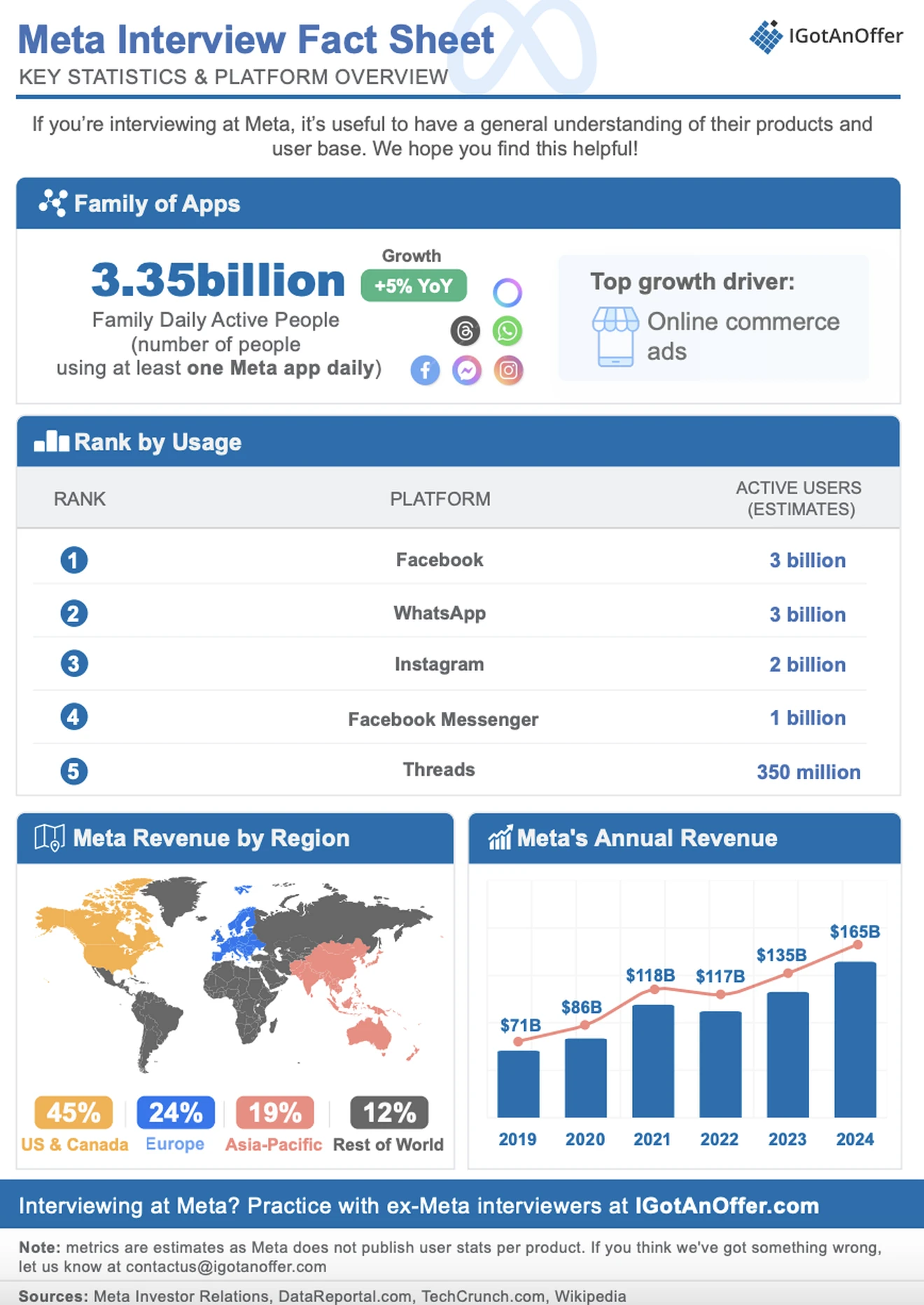
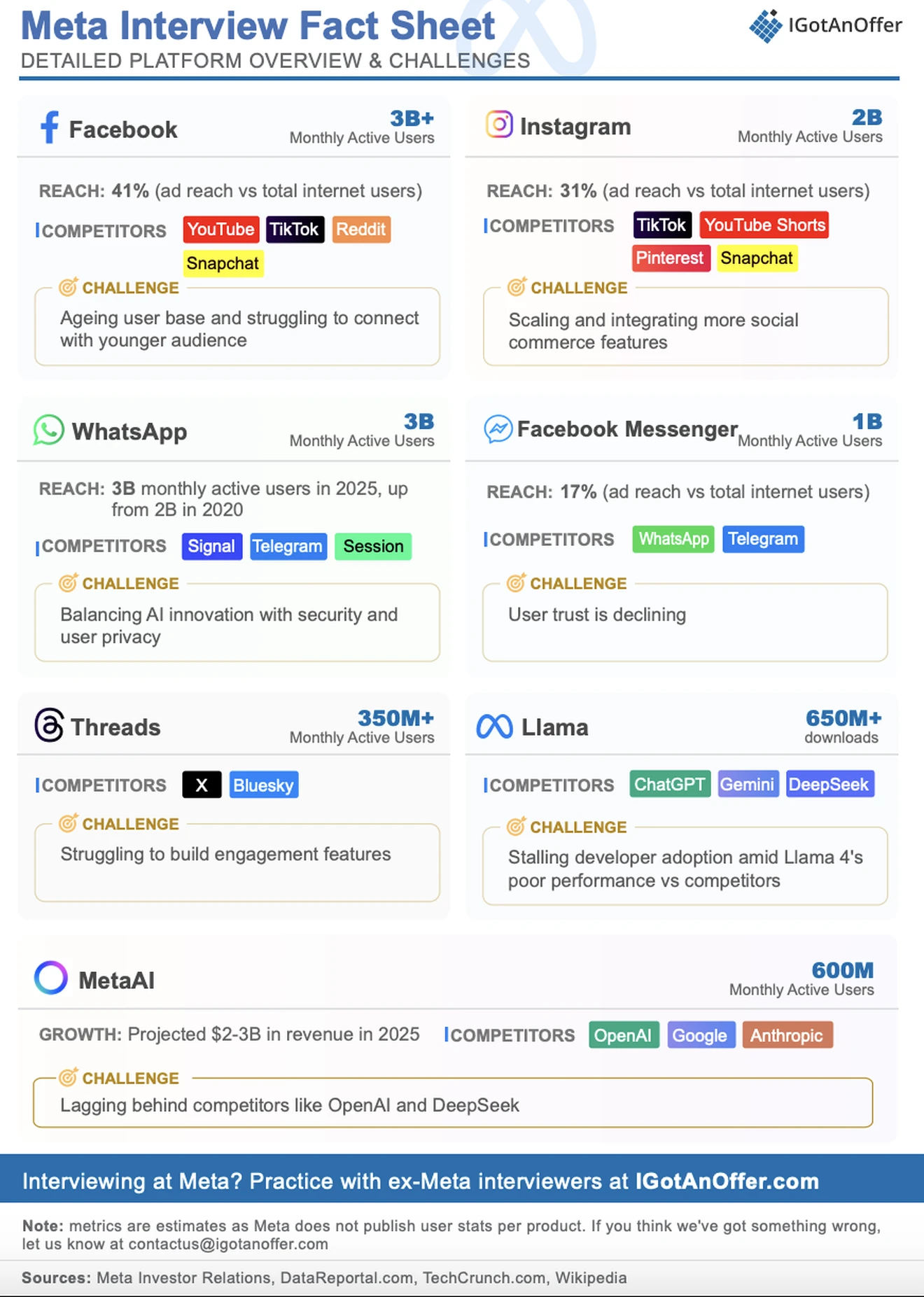
2. Understand the requirements↑
The bad news: Meta can afford to be extremely picky about who it even interviews, let alone employs.
The good news: there are always a lot of job openings available and what Meta is looking for varies a lot across roles and teams, so you don’t have to fit a certain profile to get in.
Let’s take a look at some of the basic requirements.
2.1 Academic qualifications
College degrees are not obligatory for open jobs at Meta but if you don't have one, you'll need to demonstrate the 'equivalent practical experience." That could be professional experience, or it could be via personal projects, unpaid work, etc.
If you're applying for an engineering role, you'll need a "Bachelor's degree in Computer Science, Computer Engineering, relevant technical field, or equivalent practical experience."
Keep in mind that the more years of professional experience you have, the less important your degree (or lack of one) becomes. Same goes for your test scores and GPA.
This leads us to the next point.
2.2 Experience
Most job openings at Meta require at least 5 years of role experience, as it wants to hire people who can perform their jobs to a very high level.
If you’re very early in your career, your best bet is to apply for a Meta internship or graduate role.
If you're a product manager (or want to become one), you'll want to apply to Meta's Rotational Product Manager program. If you're an engineer, you could try the Pathways program.
These programs are very well paid (for internships) and if you do well you have a great chance of securing a permanent position. Of course, that means they're highly sought after, so making it in successfully isn't easy.
Alternatively, you could target a non-FAANG company with lower barriers to entry to gain more experience first. You’ll be more likely to get interview callbacks from Meta when you’ve got a few years of experience and impact to show on your resume.
2.3 Technical skills
No, you DON’T need technical skills to work at Meta.
Sure, if you want to work as a developer, you’ll need to write solid code (although Meta doesn't care much about which programming language you know) and have a strong understanding of computer science fundamentals (operating systems, networking, databases, etc.).
But there are plenty of roles that don’t require technical expertise, such as account manager/executive, sales, or strategy & operations.
Even for product managers and program managers, the bar on having technical knowledge is much lower at Meta than it is at companies such as Google. In fact, our research shows that only ~50% of Meta product managers hold a "technical" degree such as computer science.
2.4 MBAs as a route into Meta
Doing an MBA at a top business school can be an effective route into Meta or another big tech company. Every year, big tech companies will hire 200-300 people from prestigious MBA programs.
Some business schools have strong relationships with Silicon Valley and big tech recruiters, so an MBA at the right school can not only improve your resume but enable you to build your personal network.
However, given the cost of these MBAs, you may be better off spending a couple of years working and gaining real-world experience.
3. Choose the right role↑
It isn’t always obvious which sort of roles you should apply for.
One of the most common questions people ask our coaches is “What are my chances of getting through Meta's hiring filters for this role with my current resume and experience?” And “Is this a suitable goal for me or should I aim higher/lower?”
For instance, you might be a senior software engineer at a medium-sized company; should you apply for senior roles at Meta, or aim lower?
If you’ve got management experience, should you aim for Meta manager track positions or are they more difficult to land?
Meanwhile, if you’re coming from outside tech, picking the right role is even more challenging.
You’ll need to build up an accurate understanding of which roles interest you most, where you can bring the most value, and where your knowledge and experience gaps lie.
To some extent, you can do this via careful reading of relevant job descriptions, but talking to a career coach who has worked at Meta is the most effective way to gain clarity.
"I was in consulting at Deloitte but wanted to move into tech. I interviewed unsuccessfully with Google, but with coaching, I landed an offer at Meta. Now I'm working with a program management team at Meta and creating privacy principles within the PM team. Meta is looking into the future of Metaverse, and that's exciting too." Preeti, privacy program manager L4 at Meta.
4: Optimize your resume for Meta↑
Meta is one of the most prestigious companies around. As you'd expect, acceptance rates are low.
Most candidates don’t get past the resume screening and you should invest at least a few hours making sure your resume is as good as it can possibly be.
Tips on crafting a resume for Meta:
- Study the job description. The work experience that you showcase on your resume should relate directly to the role qualifications that you’re applying to.
- Be specific. Use data to back up your claims. How many people were on the team that you managed? How were your successes measured? Give numbers, percentages, whatever you can to quantify your impact.
- Emphasize leadership. Meta values emergent leadership. As much as you can, highlight instances where you took the lead and managed others. Remember, leadership isn’t about titles - you can demonstrate leadership without having had a leadership position.
- Facilitation skills. If you're applying for a management role, you need to show you'll be able to help your team progress, removing obstacles and solving blockages. Try to include an example that shows how you unblocked a project, took preemptive action to avoid a bottleneck, or improved a process.
- System design skills are often needed for engineering roles at Meta. You'll need to be able to discuss engineering architecture and make decisions relating to efficiency, scalability, and performance. If you have any experience in designing systems, or related experience, make sure it’s prominent on your resume.
- Engineering skills. This is obvious if you're an engineer, but can also be an advantage when applying to non-technical roles.
- Be concise. Meta recruiters often don’t have the time to study a resume in-depth, so make sure to keep your resume clear and concise. Cherry-pick your highlights rather than giving a comprehensive summary of everything you’ve done.
The tips above include abbreviated information from our big tech resume guides. For more detailed steps, templates, tips, and real examples from successful candidates at Meta and other top tech companies, take a look at one of our resume guides below:
- How to write a software engineering resume
- How to write a product manager resume
- How to write an engineering manager resume
- How to write a technical program manager resume
The guides above are great starting points for you to make a competitive resume for free. However, if you want personalized feedback and tips from those who know Meta's hiring processes firsthand, you can get input from our Meta resume coaches.
5. Create a connection↑
If you have a connection to someone at Meta, use it! Ask them to refer you for a role you’re applying for.
This may increase your chances of getting into the interview process. At the least, it makes it likely that your application will get a fair viewing, avoiding the possibility that it’s lost amidst the vast amount of general online applications.
If you end up landing the job, your contact should get paid a bonus for referring you, so it’s a win-win.
If you don’t have a contact in Meta, consider investing some time in improving your network. Here are four actions you could take.
5.1 Build a networking funnel
In essence, networking is a sales process, and getting organized in advance will set you up for success.
Begin by creating a spreadsheet of potential contacts. Okay, so maybe you don’t know anyone at Meta. But do you know someone who knows someone?
Make a list of acquaintances or ex-colleagues who could connect you with someone inside Meta. Your last priority should be cold contacts.
5.2 Feed the funnel: go to Meta events
Once you have your spreadsheet set up (i.e. your funnel), then you need to create as many new connections as possible to feed your funnel. You should specifically target events organized by Meta or an event where someone from Meta is speaking. Go to an event and talk to them!
If you can’t get to events, try online events/webinars.
5.3 Send good emails and keep following up
Whether you are following up from an in-person conversation, or you are cold-contacting someone, it's important to send good emails and follow-ups. Aim to build rapport, and to make it easy for the person to say yes to you.
It's also important for you to follow up until you get a clear answer, many people will be open to a short phone call or coffee meet-up.
We like this advice on how to write effective cold emails.
5.4 Be ready to sell yourself
This is a critical step. You want to make sure that you are prepared for impromptu “interviews” as you begin to have conversations with your contacts.
They’re not going to grill you as if you were in a Meta interview, but it’s worth practicing talking about your motivation for joining the company and what you think you could bring.
You need to be ready to sell yourself (without coming over as overbearing) and that takes practice.
5.5 Don’t just ask for a referral straight away
If you manage to get in touch with someone at Meta, don’t just straight up ask them to refer you before you’ve even met them. If they don’t know anything about you, it’s unlikely that they’d feel comfortable referring you even if your resume is outstanding.
Instead, explain that you’d like to pick their brains about the company. Once you’ve established some connection with them and they understand a bit more about what you can bring to the role, they might be happy to refer you.
6. Apply↑
Right, so you’ve got a stand-out resume and you’re confident you’re targeting the right role at Meta. It’s time for action!
Hopefully, you’ve managed to get a referral, but if not, apply through one of the company’s main jobs pages:
7. Prepare for the interviews↑
Once you’ve applied, hopefully you’ll get put through to the start of the interview process.
The interview process at Meta usually takes 2 to 3 months. The stages include: resume screen, recruiter call, initial screen(s), interview loop, interviewer debrief, hiring committee, and salary negotiation.
The steps that will require the most preparation are the phone screens and full interview loops which are usually onsite at the company’s local offices.
If you’re a software engineer, you’ll need to prepare for coding (yes, you’ll be solving Leetcode problems in your sleep), behavioral questions to test you on leadership and other soft skills, and system design. Plan for months, not weeks, of prep.
Whether you're targeting an engineering role or something completely different, we recommend you use one of our Meta interview guides as a starting point.
- Top 5 Meta Interview Questions (with Answers)
- Meta Phone Screen interview guide
- Meta Team Matching guide
- Meta E6 interview guide
- Meta Software Engineer interview guide
- Meta Engineering Manager interview guide
- Meta Product Manager interview guide
- Meta Product Marketing Manager interview guide
- Meta Rotational Product Manager interview guide
- Meta Data Engineer interview guide
- Meta Data Scientist interview guide
- Meta Machine Learning Engineer interview guide
- Meta Production Engineer interview guide
- Meta Front-end Engineer interview guide
- Meta Technical Program Manager interview guide
- Meta Program Manager interview guide
- Meta Account Manager interview guide
- Meta Product Designer interview guide
- Meta Research Engineer interview guide
"Practice, practice, practice! Interviewers don't need you to recite stuff from memory. Instead, make sure you know the building blocks and how to use them in different scenarios." Carlos landed an Engineering Manager role at Meta.
Given how competitive getting into big tech is, you should also try to practice Meta mock interviews with Meta ex-interviewers. They’ll be able to give you accurate, actionable feedback that will take your interview performance up a level and increase your chances of landing an offer.
And don’t be disheartened if you get rejected from Meta on your first attempt. Most people do! One of the keys to getting into Meta is to get feedback from an expert and then keep trying- we’ve worked with plenty of candidates who landed an offer after multiple attempts.
To learn more about how to deal with a Meta rejection, check out our Meta interview rejection guide.
Take a big step towards a job at Meta↑
Navigating your path toward that job at Meta becomes a lot easier when you’ve picked the brains of someone on the inside.
Browse the 100+ ex-Meta coaches on our platform - you’ll find many who have worked there in your target role. Book a coaching session and start building an actionable plan of attack to achieve your goals.











